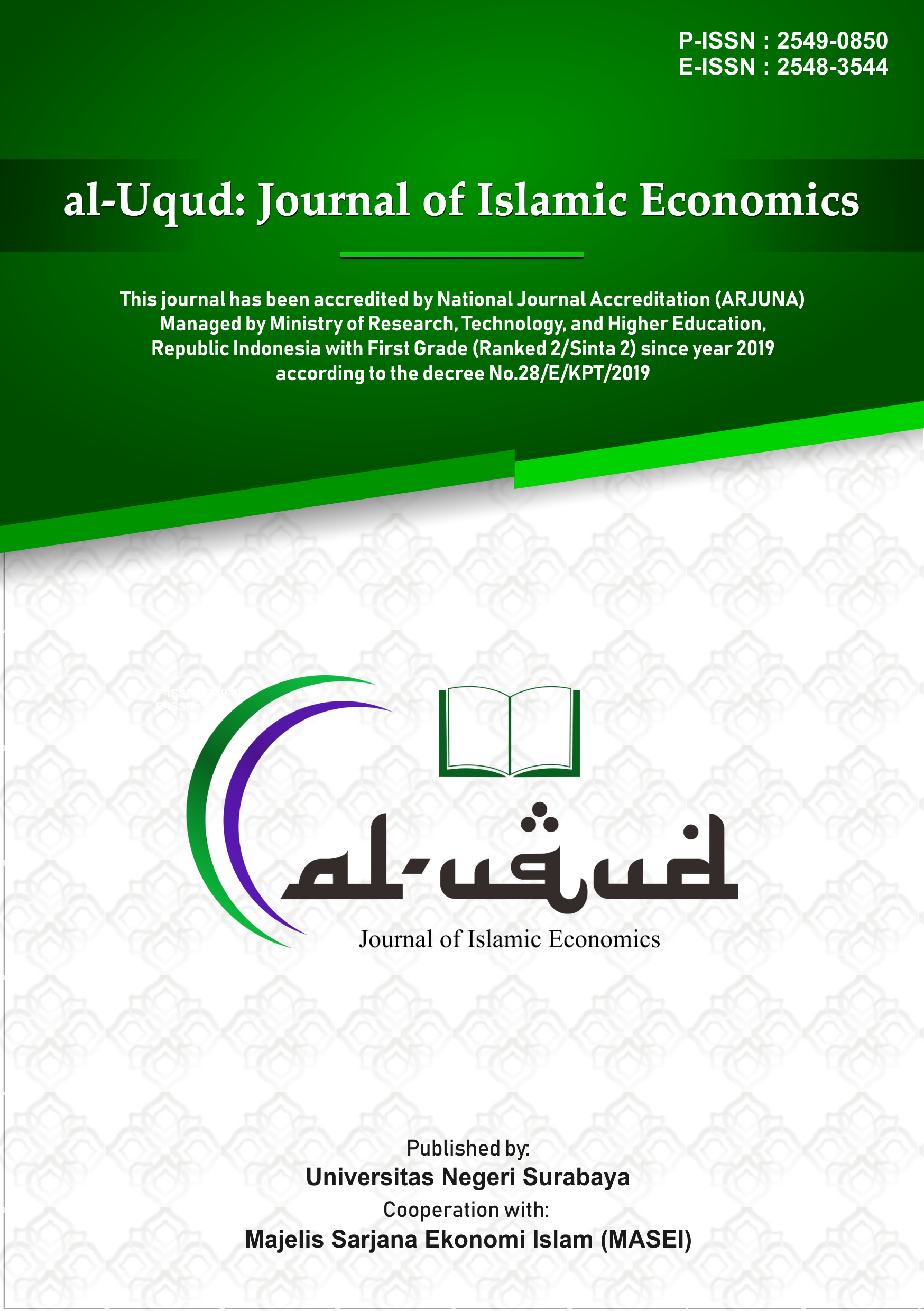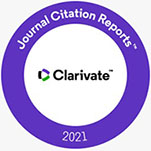The Impact of Internet-Based Corporate Governance Sharia (IBCGS) Rating on Shareholders Trust in Jakarta Islamic Index Companies
DOI:
https://doi.org/10.26740/aluqud.v5n2.p327-344Keywords:
Sharia corporate governance, IBCGS, stakeholder trustAbstract
The purpose of this research is to present the quality measurement of internet-based Islamic corporate governance and identify its effects on stakeholder trust. In measuring the implementation of corporate governance, this study uses the method of measuring the quality of Islamic corporate governance (IBCGS), as the development of IBCG and IBCG Rating Modified. This research uses descriptive exploratory analysis tools with PLS-SEM as the statistical tool. The object of this research is a company registered in the Jakarta Islamic Index (JII). The results showed that the implementation of corporate governance based on IBCGS by sample companies had been implemented but with varying quality. Meanwhile, the implementation of corporate governance in sharia companies positively influences shareholder trust manifested by their return on equity, stock returns and earnings per share. The findings of this study are expected to contribute to the signalling theory and agency theory in explaining the influence of the quality of corporate governance on the shareholder trust that should be concerned by sharia companies.
References
Aggarwal, P. (2013). Impact of Corporate Governance on Corporate Financial Performance. IOSR Journal of Business and Management, 13, 01-05.
Al-ahdal, W.M., Alsamhi, M.H., Tabash, M. I., Farhan, N.H.S. (2020). The impact of corporate governance onfinancial performance ofIndian and GCC listedfirms: An empirical investigation. Research in International Business and Finance. 51. 1-13. https://doi.org/10.1016/j.ribaf.2019.101083.
Al-Homaidi, E.A., Al-Matari, E.M., Tabash, M.I., Khaled, A.S.D., Senan, N.A.M. (2021). The influence of corporate governance characteristics on profitability of Indian firms: An empirical investigation of firms listed on Bombay Stock Exchange. 18(1). 114-125. http://dx.doi.org/10.21511/imfi.18(1).2021.10.
Al-Malkawi, H., Pillai, R., & Bhatti, M. (2014). Corporate governance practices in emerging markets: The case of GCC countries. Economic Modelling, 38, 133-141. https://doi.org/10.1016/j.econmod.2013.12.019.
Ammann, M., Oesch, D., & Schmid, M. (2013). Product Market Competition, Corporate Governance, and Firm Value: Evidence from the E.U. Area. European Financial Management, 19(3), 452-469. https://doi.org/10.1111/j.1468-036x.2010.00605.x.
Balasubramanian, B., Black, B., & Khanna, V. (2010). The Relation between Firm-Level Corporate Governance and Market Value: A Study of India. SSRN Electronic Journal. The nearly final version, published in Emerging Markets Review, Vol. 11, pp. 319-340. https://doi.org/10.2139/ssrn.1586460.
Bank Indonesia. (2010). Pelaksanaan Good Corporate Governance bagi Bank Umum Syariah dan Unit Usaha Syariah. Surat Edaran BI. Jakarta.
Boateng, E., Adam, A.M., Junior, P.O. (2021). Modelling the heterogeneous relationship between the crude oil implied volatility index and African stocks in the coronavirus pandemic. Resources Policy. 74. https://doi.org/10.1016/j.resourpol.2021.102389
Borisova, G., Brockman, P., Salas, J., & Zagorchev, A. (2012). Government ownership and corporate governance: Evidence from the E.U. Journal of Banking & Finance, 36(11), 2917-2934. https://doi.org/10.1016/j.jbankfin.2012.01.008.
Braga-Alves, M., & Shastri, K. (2011). Corporate Governance, Valuation, and Performance: Evidence from a Voluntary Market Reform in Brazil. Financial Management, 40(1), 139-157. DOI: 10.1111/j.1755-053x.2010.01137.
Buallay, Amina; Hamdan, Allam; and Zureigat, Qasim. (2017). Corporate Governance and Firm Performance: Evidence from Saudi Arabia. Australasian Accounting, Business and Finance Journal, 11(1), 78-98. doi:10.14453/aabfj.v11i1.6.
Chang, Y., Iakovou, E., & Shi, W. (2020). Blockchain in global supply chains and cross border trade: a critical synthesis of the state-of-the-art, challenges and opportunities. International Journal of Production Research, 58(7), 2082-2099.
Cui, Y., Zhang, Y., Guo, J., Hu, H., Meng, H. (2019). Top management team knowledge heterogeneity, ownership structure and T financial performance: Evidence from Chinese IT listed companies. Technological Forecasting & Social Change. 140. 14-21. https://doi.org/10.1016/j.techfore.2018.12.008
DSN MUI. (2000). MUI Fatwa No. 05/DSN-MUI/IV/2000 fatwa tentang Jual Beli Saham. Retrieved Januari 20, 2020 from https://dsnmui.or.id/kategori/fatwa/page/14/.
Edmans, A. (2014). Blockholders and Corporate Governance. Annual Review of Financial Economics, 6(1), 23-50. https://doi.org/10.1146/annurev-financial-110613-034455.
Francis, B., Hasan, I., Song, L., & Waisman, M. (2013). Corporate governance and investment-cash flow sensitivity: Evidence from emerging markets. Emerging Markets Review, 15, 57-71. https://doi.org/10.1016/j.ememar.2012.08.002.
Ghozali, I., (2018). Aplikasi Analisis Multivariate Dengan Program IBM SPSS 25, Edisi Kesembilan. Semarang: Penerbit Undip.
Grassa, R. and Matoussi, H. (2014). Corporate governance of Islamic banks: A comparative study between GCC and Southeast Asia countries. International Journal of Islamic and Middle Eastern Finance and Management, Vol. 7 No. 3, pp. 346-362. https://doi.org/10.1108/IMEFM-01-2013-0001.
Grzybkowski, M., & Wojcik, D. (2006). Internet and Corporate Governance. SSRN Electronic Journal. https://doi.org/10.2139/ssrn.914520.
Gu, L., & Hackbarth, D. (2012). Governance and Equity Prices: Does Transparency Matter?. SSRN Electronic Journal. https://doi.org/10.2139/ssrn.1970294
Hair, J. F., Risher, J. J., Sarstedt, M., & Ringle, C. M. (2019). When to use and how to report the results of PLS-SEM. European Business Review.
Hartono, Ulil., Subroto, Bambang., Djumahir., dan Irianto, Gugus. (2013). Firm Characteristics, corporate governance dan firm value. International Journal of Business and Behavioral Science, Vol.3, No 8.
Hasan, Z. (2011). A survey on Shari'ah governance practices in Malaysia, GCC countries and the U.K.: Critical appraisal. International Journal of Islamic and Middle Eastern Finance and Management, Vol. 4 No. 1, pp. 30-51. https://doi.org/10.1108/17538391111122195.
JDIH. (2011). Peraturan Menteri BUMN PER-01/MBU/2011. Retrieved January 30, 2020 from https://jdih.bumn.go.id/lihat/PER-01/MBU/2011.
Kementerian Agama RI, Yayasan Penyelenggara Penerjemaah Al-Qur'an, & Lajnah Pentashih Mushaf Al-Qur'an Indonesia. (2018). Al-Qur'an dan Terjemahnya (1st ed.). Solo: Tiga Serangkai.
Krafft, J., Qu, Y., Quatraro, F., & Ravix, J. (2013). Corporate governance, value and performance of firms: new empirical results on convergence from a large international database. Industrial And Corporate Change, 23(2), 361-397. DOI: 10.1093/ICC/dtt007.
Kyere, M. & Ausloss, M. (2021). Corporate governance and firms financial performance inthe United Kingdom. International Journal of Finance & Economics. 26(2). 1871-1885. https://doi.org/10.1002/ijfe.1883
Li, W., Chen, C., & French, J. (2012). The relationship between liquidity, corporate governance, and firm valuation: Evidence from Russia. Emerging Markets Review, 13(4), 465-477. DOI: 10.1016/j.ememar.2012.07.004
Mishra, S., & Mohanty, P. (2014). Corporate governance as a value driver for firm performance: evidence from India. Corporate Governance, 14(2), 265-280. https://doi.org/10.1108/cg-12-2012-0089.
Muneeza, A. dan Hassan, R. (2014). Shari'ah corporate governance: the need for a special governance code. Corporate Governance, Vol. 14 No. 1, pp. 120-129. https://doi.org/10.1108/CG-02-2011-0015.
Musdholifah dan Hartono, Ulil. (2015). Pengembangan IBCG Rating sebagai Pengukuran Kualitas Corporate Governance dan dampaknya pada Nilai Perusahaan. Laporan Penelitian. Lembaga Penelitian dan Pengabdian Kepada Masyarakat UNESA. Unpublished.
Musdholifah., Hartono, Ulil., Witjaksono, Andre Dwijanto. (2017). Pengembangan Model Penilaian Corporate Governance Berbasis Syariah dan Implikasinya kepada Kepercayaan Stakeholders. Lembaga Penelitian dan Pengabdian Kepada Masyarakat UNESA. Unpublished.
Nel, G., Schotz, H., Waldette, E. (2020). Relationship between online corporate governance and transparency disclosures and board composition: evidence from JSE listed companies. Journal of African Business. https://doi.org/10.1080/15228916.2020.1838831
Obid, S. N. S., & Naysary, B. (2016). Toward a comprehensive theoretical framework for Shariah governance in Islamic financial institutions. In Islamic Finance (pp. 10-31). Palgrave Macmillan, Cham. https://doi.org/10.1007/978-3-319-30918-7_2.
OECD. (2015). G20/OECD Principles of Corporate Governance. The OECD, Paris.
Pham, P., Suchard, J., & Zein, J. (2011). Corporate governance and alternative performance measures: evidence from Australian firms. Australian Journal Of Management, 36(3), 371-386. DOI: 10.1177/0312896211413035.
Rachmadianti, V.A. & Iswajuni. (2020). The link between corporate governance and owernship to firm performance. Polish Journal of Management Studies. 22(2). 414-427. https://doi.org/10.17512/pjms.2020.22.2.27
Sami, H., Wang, J., & Zhou, H. (2011). Corporate governance and operating performance of Chinese listed firms. Journal Of International Accounting, Auditing And Taxation, 20(2), 106-114. DOI: 10.1016/j.intaccaudtax.2011.06.005
Sehrawat, N.K., Singh, S., Kumar, A. (2020). Does corporate governance affect financial performance of firms? A large sample evidence from India. Business Strategy and Development. 3(4). 615-625. https://doi.org/10.1002/bsd2.126
Siagian, F., Siregar, S., & Rahadian, Y. (2013). Corporate governance, reporting quality, and firm value: evidence from Indonesia. Journal Of Accounting In Emerging Economies, 3(1), 4-20. DOI: 10.1108/20440831311287673
Solomon, J. (2020). Corporate Governance and Accountability. United Kingdom: Wiley.
Tricker, R. (2019). Corporate governance (4th ed.). Oxford University Press.
Utama, C.A., Utama, S., Amarullah, F. (2017). Corporate governance and ownership structure: Indonesia evidence. Corporate Governance. 17(2). 165-189. http://dx.doi.org/10.1108/CG-12-2015-0171.
Su, W., Peng, M., Tan, W., & Cheung, Y. (2014). The Signaling Effect of Corporate Social Responsibility in Emerging Economies. Journal Of Business Ethics, 134(3), 479-491. https://doi.org/10.1007/s10551-014-2404-4.
Weli, W. & Betseda, Y. (2021). Information asymmetry and firm value on web-based integrated reporting system quality. Quality - Access to Success. 22(184). 237-246. https://doi.org/10.47750/QAS/22.184.30
Wintoki, M., Linck, J., & Netter, J. (2012). Endogeneity and the dynamics of internal corporate governance. Journal Of Financial Economics, 105(3), 581-606. DOI: 10.1016/j.jfineco.2012.03.005.
Wulandari, A. (2010). Menggagas Konsep Good Corporate governance. Pamator, Volume 3, Nomor 344. Jurusan Akuntansi, Fakultas Ekonomi, Universitas Trunojoyo. Bangkalan.
Zhou, H., Owusu-Ansah, S., Maggina, A. (2018). Board of directors, audit committee, and firm performance: Evidence from Greece. Journal of International Accounting, Auditing and Taxation. 31. 20-36. https://doi.org/10.1016/j.intaccaudtax.2018.03.002.
Downloads
Published
How to Cite
Issue
Section
License
Copyright (c) 2021 al-Uqud : Journal of Islamic Economics

This work is licensed under a Creative Commons Attribution 4.0 International License.
CC BY 4.0 Abstract views: 674
,
Abstract views: 674
, PDF Downloads: 454
PDF Downloads: 454








